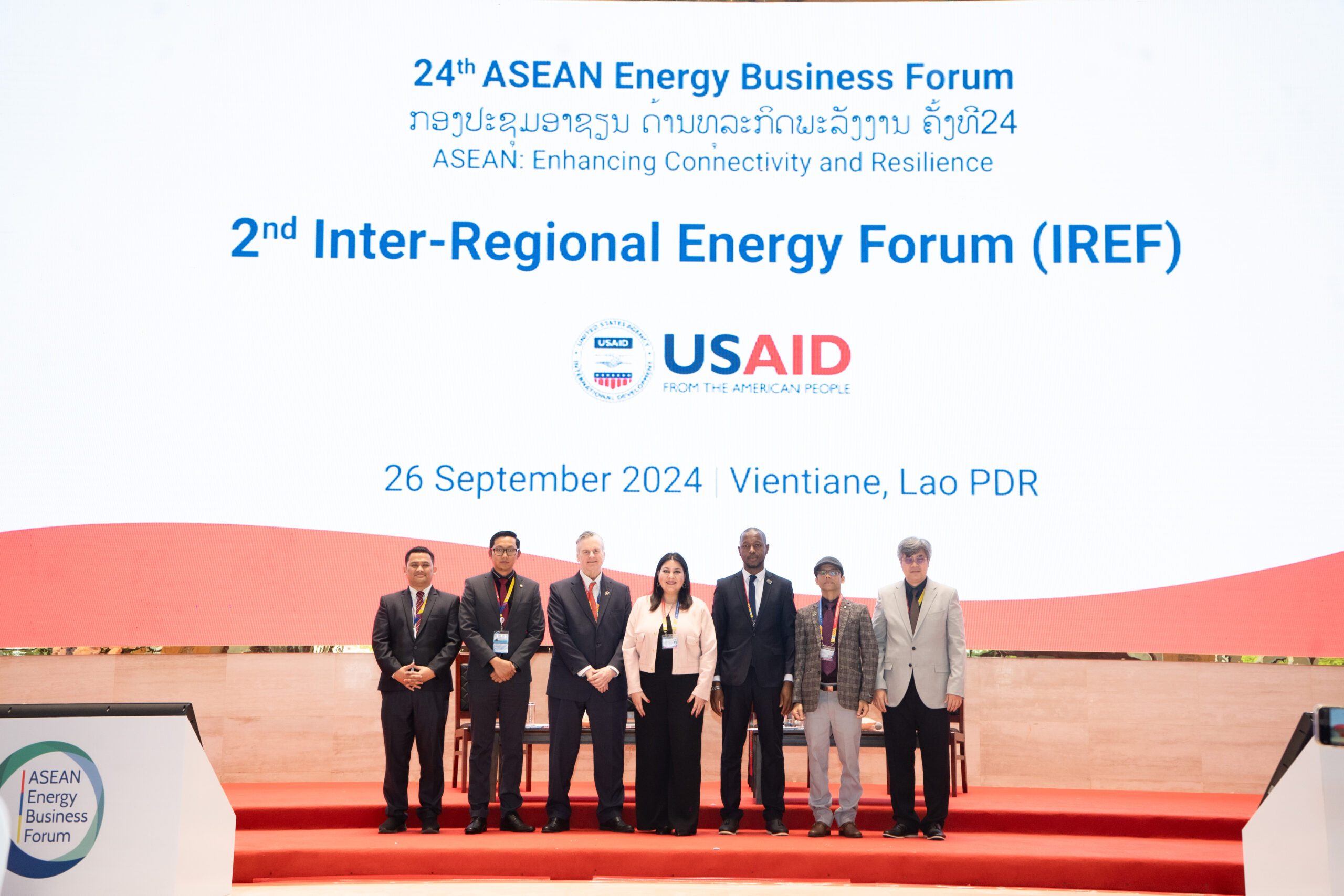Menu

Photo 1. (left-right) Dr Andy Tirta, Head of ACE and Chairman of AEBF-24, Dr Zulfikar Yurnaidi, Head of ACE, Grayson Heffner, Director of Utility Modernization and Power Trade, USAID SPP, Gloria Alvarenga, Director of Integration, Access and Energy Security at OLADE, Yagouba Traore, Head of Energy Policy, Planning, and Strategi of AFREC, and Tula Ram Poudel, Research Fellow (Energy Trade) at SEC
Vientiane, 26 September 2024 – The ASEAN Centre for Energy (ACE), supported by the USAID Southeast Asia Smart Power Program (SPP) successfully hosted the 2nd Inter-Regional Energy Forum (IREF), as part of the ASEAN Energy Business Forum 2024 (AEBF-24), in conjunction with the 42nd ASEAN Ministers on Energy Meeting (42nd AMEM) and Its Associated Meetings. The forum, which focused on the theme “Balancing Regional Energy Trilemma to Support Socio-economic Developments and Net Zero Targets”, brought together four (4) prominent energy organisations from four major regions: Southeast Asia, Latin America, Africa, and South Asia.
The IREF served as a platform to foster deeper cooperation and collaboration across regions in addressing the shared challenges of the global energy transition. By exchanging knowledge, strategies, and best practices, the forum emphasised the need for secure, affordable, and sustainable energy to support socio-economic development.
Grayson Heffner, Director, Utility Modernization and Power Trade, USAID SPP, stated “SPP is proud to support Southeast Asia’s regional economic growth and development through a secure, market-driven energy sector. We are also pleased to participate in the IREF initiative, which enables dialogue between regional energy entities on the key challenges and solutions to multilateral power cooperation and energy resilience in the region and around the world.”
Structured on two consecutive days in separate sessions, the first session was a closed-door roundtable discussion between the ASEAN Centre for Energy (ACE), Latin American Energy Organization (OLADE), African Energy Commission (AFREC), and South Asian Association for Regional Cooperation Energy Centre (SAARC EC), in conjunction with the 42nd AMEM, focusing on best practices to enhance regional energy connectivity. The second session, a public panel held during AEBF-24, provided regional energy experts the opportunity to present the latest outlooks and strategies for regional energy provision. Engaging both governmental bodies and the public, the forum facilitated comprehensive dialogue in advancing energy security, accessibility, affordability, and sustainability.
The 2nd IREF builds upon the success of the 1st IREF held in Bali, Indonesia, in conjunction with the AEBF 2023, is a testament of ACE’s commitment in strengthening inter-regional partnerships and driving the global energy transition. The forum will further promote collaboration between regions through initiatives such as joint projects, policy dialogues, and the sharing of best practices.
***
About ASEAN Centre for Energy (ACE)
Established on 1 January 1999, the ASEAN Centre for Energy (ACE) is an intergovernmental organisation within the Association of Southeast Asian Nations’ (ASEAN) structure that represents the 10 ASEAN Member States’ (AMS) interests in the energy sector. ACE supports the implementation of the ASEAN Plan of Action for Energy Cooperation (APAEC), a blueprint for better collaboration towards upgrading energy. The Centre is guided by a Governing Council composed of Senior Officials on Energy from each AMS and a representative from the ASEAN Secretariat as an ex-officio member.
The three key roles of ACE:
Keeping the region’s improvement, sustainable and harmless to the ecosystem is a fundamental concern of the ASEAN energy sector. Hosted by the Ministry of Energy and Mineral Resources of Indonesia, ACE’s office is located in Jakarta, Indonesia. For more information on ACE website: aseanenergy.org.
About USAID SPP
The United States Agency for International Development (USAID) Southeast Asia Smart Power Program (SPP) is a five-year initiative to transform energy sectors and improve access to clean, reliable, and affordable energy. Southeast Asia is undergoing rapid economic growth, and sustaining such progress requires affordable and reliable energy services. As the flagship clean energy program of the USAID Regional Development Mission for Asia, SPP advances economic growth and development by ensuring secure, market-driven, and low carbon energy sectors help the region achieve net-zero greenhouse gas emissions by 2050. Throughout its five-year program, SPP anticipates contributing to the deployment of 2,000 MW of advanced energy systems, the mobilization of $2 billion in clean energy finance, and a five percent increase in regional power trade. For more information, please refer to the SPP factsheet available at http://www.usaid.gov/.
For further information, please contact:
For media inquiries, please contact:
[email protected]
Communications Team
Corporate Affairs Department
